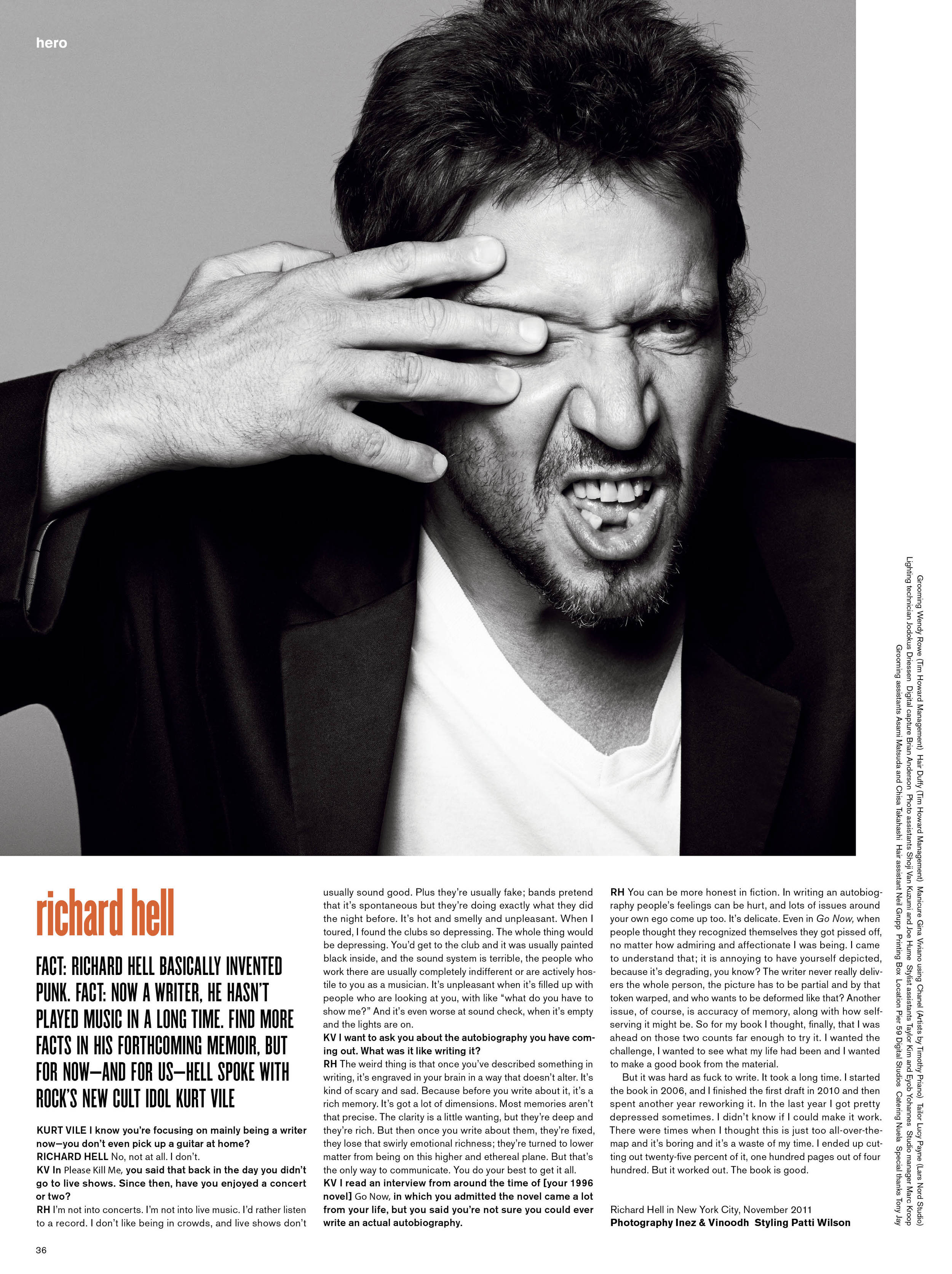Elliott W. David
INTERVIEWS AND SUCH
Index
Started up a correspondence with Richard Hell. Pitched him to photographers Inez & Vinoodh. Asked Kurt Vile to do the interview. Fucking legend.
PHOTOGRAPHY INEZ & VINOODH
STYLING PATTI WILSON
INTERVIEW KURT VILE
RICHARD HELL BASICALLY INVENTED PUNK. NOW A WRITER, HE HASN'T PLAYED MUSIC IN A LONG TIME. HIS FORTHCOMING MEMOIR WILL BE OUT IN THE SPRING, BUT FOR NOW—AND FOR US—HELL SPOKE WITH ROCK'S NEW CULT IDOL, KURT VILE.
KURT VILE I know you're focusing on mainly being a writer now-you don't even pick up a guitar at home?
RICHARD HELL No, not at all. I don't.
KV In Please Kill Me, you said that back in the day you didn't go to live shows. Since then, have you enjoyed a concert or two?
RH I'm not into concerts. I'm not into live music. I'd rather listen to a record. I don't like being in crowds, and live shows don't 36 usually sound good. Plus they're usually fake; bands pretend that it's spontaneous but they're doing exactly what they did the night before. It's hot and smelly and unpleasant. When I toured , I found the clubs so depressing. The whole thing would be depressing. You'd get to the club and it was usually painted black inside, and the sound system is terrible, the people who work there are usually completely indifferent or are actively hostile to you as a musician. It's unpleasant when it's filled up with people who are looking at you, with like "what do you have to show me?" And it's even worse at sound check, when it's empty and the lights are on.
KV I want to ask you about the autobiography you have coming out. What was it like writing it?
RH The weird thing is that once you've described something in writing, it's engraved in your brain in a way that doesn't alter. It's kind of scary and sad. Because before you write about it, it's a rich memory. It's got a lot of dimensions. Most memories aren't that precise. The clarity is a little wanting, but they're deep and they're rich. But then once you write about them, they're fixed , they lose that swirly emotional richness; they're turned to lower matter from being on this higher and ethereal plane. But that 's the only way to communicate. You do your best to get it all.
KV I read an interview from around the time of [your 1996 novel] Go Now, in which you admitted the novel came a lot from your life, but you said you're not sure you could ever write an actual autobiography.
RH You can be more honest in fiction. In writing an autobiography people's feelings can be hurt, and lots of issues around your own ego come up too. It's delicate. Even in Go Now, when people thought they recognized themselves they got pissed off, no matter how admiring and affectionate I was being. I came to understand that; it is annoying to have yourself depicted, because it's degrading , you know? The writer never really delivers the whole person , the picture has to be partial and by that token warped, and who wants to be deformed like that? Another issue, of course, is accuracy of memory, along with how selfserving it might be. So for my book I thought, finally, that I was ahead on those two counts far enough to try it. I wanted the challenge, I wanted to see what my life had been and I wanted to make a good book from the material. But it was hard as luck to write. It took a long time. I started the book in 2006, and I finished the first draft in 2010 and then spent another year reworking it. In the last year I got pretty depressed sometimes. I didn't know if I could make it work. There were times when I thought this is just too all-over-themap and it's boring and it's a waste of my time. I ended up cutting out twenty-five percent of it, one hundred pages out of four hundred. But it worked out. The book is good.
